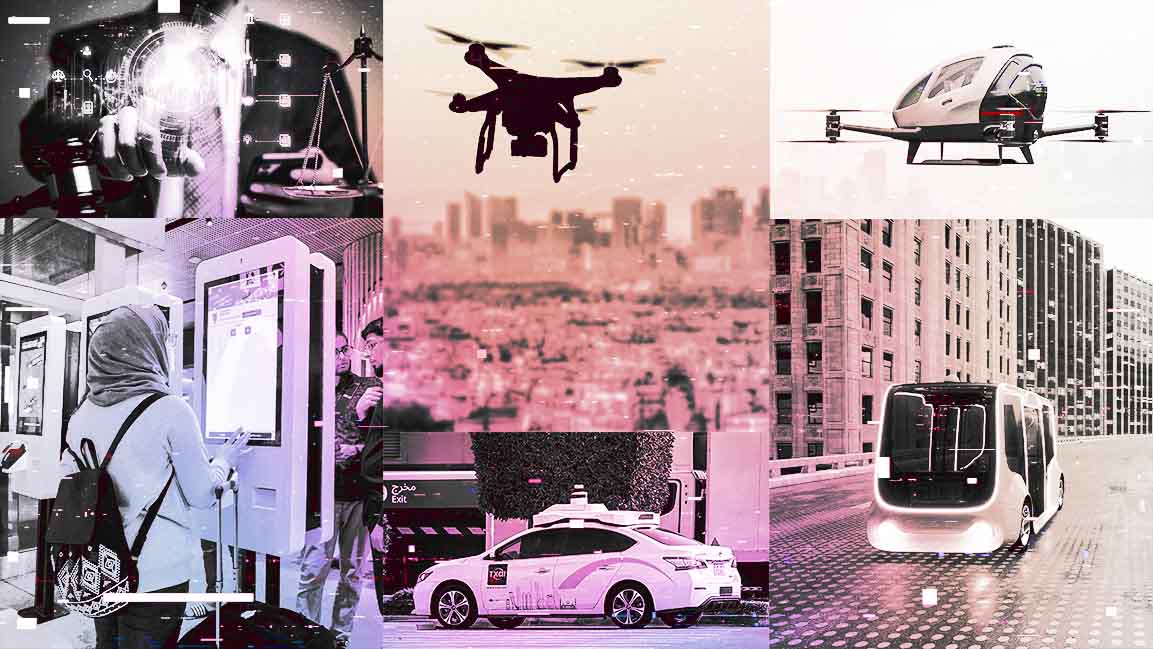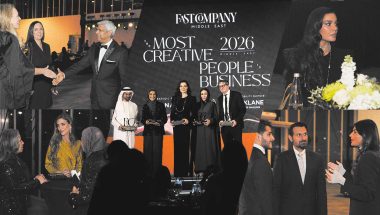- | 9:00 am
How the GCC is reimagining public services as future labs
From AI-powered kiosks and co-created urban policies to real-time drone surveillance and digital courtrooms, governments across the region are not just embracing innovation, they’re embedding it into the everyday services citizens rely on

Not long ago, cranes and rope-access teams were cleaning the facades of the tall towers that make up the cities’ skyline in the GCC countries. Now, a smarter shift is underway: autonomous drones are taking over.
The idea didn’t start in a lab but in a conversation between two longtime friends—one of whom had spent years toggling between New York and Dubai, firmly believing in tech as a force for prosperity. “I kept asking myself: what problem have we overlooked in our own backyard?” recalls Ammar Javaid, founder of EXO Drones. “Once we landed on cleaning drones, it just clicked. The buildings are futuristic, but the maintenance is stuck in the past.”
Across the Middle East, public infrastructure is becoming a living lab, where startups co-create smarter, safer, and more sustainable services.
With support from aviation regulators and venue operators, Dubai is emerging as a proving ground for autonomous drone tech, where futuristic concepts meet practical deployment. “We’re pulled into new use cases we hadn’t even imagined,” Javaid says. “This city is a sandbox for innovation.”
It symbolizes a deeper shift: governments are no longer just customers of innovation. They’re becoming co-designers.
PARTICIPATORY AND EXPERIMENTAL GOVERNANCE
Dima Sayess, Partner and Ideation Center Lead at Strategy& Middle East, sees this shift as part of a larger transformation. “GCC governments are rewriting the innovation playbook by embedding participatory and experimental methods into governance,” she says, adding that citizens, businesses, NGOs, and academia are becoming strategic partners in policy design and public service delivery.
This participatory approach is visible in initiatives like the Mohammed bin Rashid Smart Majlis, which crowdsources ideas from residents, or Dubai Future Accelerators, which invite startups to solve government challenges.
From Saudi’s Hajj Hackathon to youth innovation councils across the region, the GCC is experimenting in real time, treating innovation as a shared, public good.
The biggest shift is toward “predictive and personalized services,” Sayess adds, highlighting unified platforms like UAE Pass, Saudi’s Absher, and TAMM in Abu Dhabi — which are evolving beyond digital portals into intuitive, proactive layers of government interaction that anticipate citizen needs, even before requests are made.
Regulatory sandboxes and AI labs further accelerate progress, enabling low-risk, high-impact experimentation.
FROM CITIZEN PORTALS TO AI COPILOTS
This collaboration between startups and governments also powers new kinds of citizen-facing digital experiences. One standout example is ArtisanAI, a regional startup founded by Ryan D’Souza, which is building generative AI copilots to simplify public service access.
“Think of us as building a ChatGPT for citizen services,” says D’Souza. “People don’t want to navigate 30-page PDFs or wait on hold. In real time, they want clarity, empathy, and action in their language.”
Built using local regulatory data and trained in English and Arabic, ArtisanAI’s copilots are piloted across several government entities, from business licensing to family visa support. But the innovation doesn’t stop at accessibility. The platform also anonymizes and feeds user queries to public entities, helping them spot friction points and service blind spots in real time.
Meanwhile, governments are also reinventing traditional service delivery models. Online courtrooms enable litigants, lawyers, and judges to participate remotely, reducing delays and increasing judicial transparency. Across cities, smart kiosks offer quick access to essential services like license renewal or fine payments, eliminating the need for lengthy queues or paperwork.
These physical and digital touchpoints reflect a common goal: to make governance more human, responsive, and convenient.
AI THAT SPEAKS YOUR LANGUAGE
Meanwhile, conversational AI mirrors how people naturally communicate. Abrar Siddique, CEO and founder of SarahAI, believes AI should remove friction, not replace people.
“Something as basic as getting a reminder, following up on a task, or summarizing a meeting can unlock real productivity,” Siddique says. In public service contexts, this could mean license renewal nudges, application updates, or payment reminders, delivered over platforms citizens already use, like WhatsApp or voice assistants. “The potential is massive if we move beyond form-filling portals to proactive, conversational assistance.”
Siddique emphasizes meeting users where they are. “Most people here prefer talking or texting over downloading an app or filling out forms. If AI can speak the way people do, in their language and on their platform, it makes everything feel more natural,” he says. That principle drives SarahAI’s context-aware, multilingual, and deeply user-centric design.
STARTUPS AS PUBLIC SERVICE ARCHITECTS
This model, where governments act as enablers and startups as architects, is taking hold across the region. “Startups aren’t just digitizing services; they’re redesigning how public systems work,” says Madison Marks, Head of Strategic Communication at the Urban Transformation Program, UNDP Saudi Arabia, and a regional expert on startup ecosystems.
“Startups bring a user-first, iterative mindset that’s a big contrast to the compliance-heavy, stability-driven logic most government systems are built on,” Marks says. In Jordan and Egypt, founders are leapfrogging legacy infrastructure with mobile-first platforms for permitting, identity, and payments.
These ventures fill delivery gaps, enabling digital cash transfers, remote learning, or emergency aid distribution where traditional systems can’t keep up.
Proximity, Marks says, is key. “Many of these founders are solving problems they’ve personally experienced. That proximity gives them clarity, leading to relevant, scalable solutions.”
Governments are adapting to support this wave of innovation. They are lowering the barriers for testing and adoption through regulatory sandboxes, challenge-based funding, and startup accelerators. “The shift from rigid procurement to more agile, co-created models is real,” Marks says. “But to take root, these innovations also need better access to data, streamlined contracts, and regulatory breathing room.”
CITIES AS PLATFORMS FOR PARTICIPATION
Public services are becoming more accessible and participatory. Across the UAE, digital tools give citizens new ways to engage in policymaking and city-building.
As Dima Al Srouri, founder and director of Biospheric City Lab, explains, the shift is toward co-creation. “Dubai’s ecosystem is increasingly focused on participatory innovation,” she says. “We’re seeing the emergence of tools that give citizens a real stake in shaping their urban experience.”
Take Urbanist DubaiAI, which allows residents to interact with AI-generated visualizations of city solutions, or the 1 Million Prompters campaign, which equips the public with prompt engineering skills to help design AI-driven services. These aren’t just pilot programs; they’re laying the groundwork for a future where governance is collaborative by default.
In Abu Dhabi, city planners are deploying digital twins, virtual replicas of the city, to test infrastructure scenarios, monitor traffic flow, and evaluate livability in real time. The BAADR app, meanwhile, gamifies sustainability participation by rewarding citizens for behaviors aligned with green goals: reuse, switch, and conserve.
“The shift is from awareness to ownership,” says Al Srouri. “From being recipients of services to co-creators of solutions. That’s what future-ready governance looks like.”
A REGION LEADING THE WAY
Across the Middle East, a new governance model is emerging, defined by agility, inclusion, and experimentation. Governments are becoming innovation partners. Citizens are becoming contributors. Startups are becoming public service architects. From autonomous drones and AI copilots to digital twins and crowdsourced urban planning, the region is setting the pace for what human-centered, tech-enabled governance can look like in the 21st century.
As regulatory frameworks evolve and public-private collaborations deepen, the Gulf’s innovation ecosystem is well-positioned to influence global standards in how societies serve their people.







































